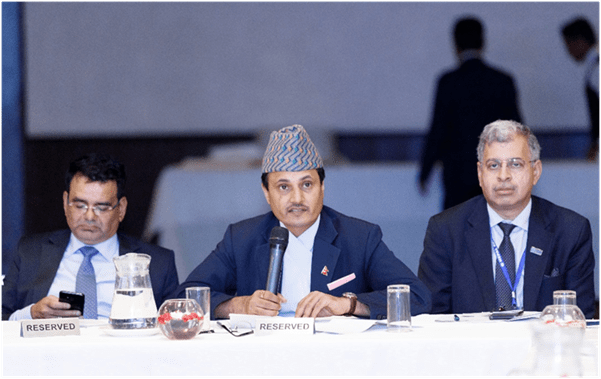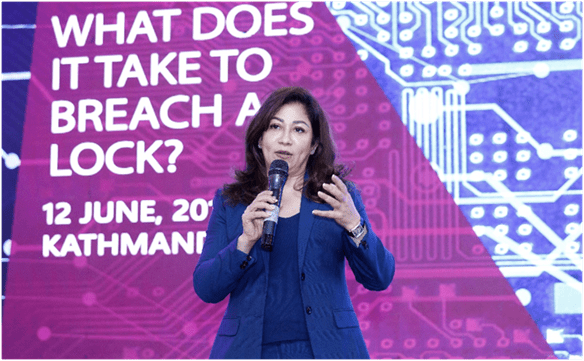Nepal Explaining The Risks Of Pirated Software, Microsoft
Kathmandu, Nepal
Microsoft meets Nepalese government officials, finance sector professionals, and SMEs to discuss economic opportunities of digital transformation and the importance of cybersecurity. Microsoft recently concluded a series of events targeting government officials, finance sector professionals, and SMEs in Nepal debating the importance of cybersecurity and economic opportunities of digital transformation. Department of IT, Ministry of Science and Communication partnered with Microsoft in conducting the conference themed “Technology & Cybercrime.”
Delivering the keynote address at this event, Mr. Birendra Mishra, Joint Secretary, Ministry of Communication and Information Technology, The Chief of Information Technology’ Division stated; “Preparing our nation for the digital age is extremely priority for economic and societal growth. The 4th industrial revolution is giving the knowledge and tools our people need so they could keep unlocking opportunities anywhere in the world. This is the best journey and not a destination, and I am glad we have organizations such as Microsoft partnering with us in this digital transformation journey.”
Mr. Birendra Mishra, Joint Secretary, Ministry of Communication and Information Technology, The Chief of Information Technology’ Division delivering the keynote address
Laxmi Prasad Yadav, Director General, Department of IT
Mr. Laxmi Prasad Yadav, Director General, Department of IT, Ministry of Communication and Information Technology delivering first speech address.
Microsoft partnered with Nepal Banker’s Association in conducting a roundtable discussion involving Banking sector decision makers with the theme “Perils of Cybercrime.” Mr. Chintamani Siwakoti, Deputy Governor, Nepal Rastra Bank delivered the keynote address at this event. CEOs and COOs of leading FSI sector organizations discussed emerging threats of cyber criminals and attacks thereby importance of making cybersecurity a boardroom discussion and not limit this to the IT heads. The Chief Guest Mr. Siwakoti also shared that the regulators are aware of the critical role played by Fintech especially in the banking sector. He added that looming cyber threats had created could risk in financial stability, and it is essential for the banks to adopt strong security measures. He also shared that NRB is in the final stages of revising the IT Policy and factors related to cybersecurity policies shall also be looked.
Mr. Gyanendra P. Dhungana, President, NBA highlighted the importance of technology in the banking sector and, efforts and resources banks have been investing in strengthening their IT infrastructure. He added that programs like this would help to raise further awareness by highlighting IT-related risks including rising cases of cybercrime.

Mr. Chintamani Siwakoti, Deputy Governor, Nepal Rastra Bank (On the middle) adding his opinion on the current situation of Cyber Security status and financial sector challenges. On left Mr. Gyanendra Pd. Dhungana, President, Nepal Bankers’ Association
Microsoft also conducted a conference named “What does it take to breach a lock” targeting small and medium businesses in Nepal explaining the risks of pirated software and opportunities associated with right licensing products such as Office 365.

Sonia Bashir Kabir, Managing Director of Microsoft Bangladesh, Nepal, Bhutan, and Laos at the SME conference; “What does it take to breach a lock.”
Expressing her views about the importance of digital transformation and cybersecurity in Nepal, Ms. Sonia Bashir Kabir, Managing Director of Microsoft Bangladesh, Nepal, Bhutan, and Laos stated; “Digital transformation can unlock extensive capabilities for emerging markets such as Nepal enabling us to leapfrog and seize opportunities out there in the world. A Frost & Sullivan study commissioned by Microsoft revealed that the potential economic loss across the Asia Pacific due to cybersecurity incidents could hit a staggering US$1.745 trillion.
This is more than seven percent of the region’s total GDP of US$24.3 trillion. The study reveals that more than half of the organizations surveyed have either experienced a cybersecurity incident (25%) or are not sure if they had one as they have not performed proper forensics or data breach assessment (27%). This indeed is an active call for decision-makers in both public and private sector organizations to take preventive action in fighting cybercrime in emerging markets such as Nepal”.






